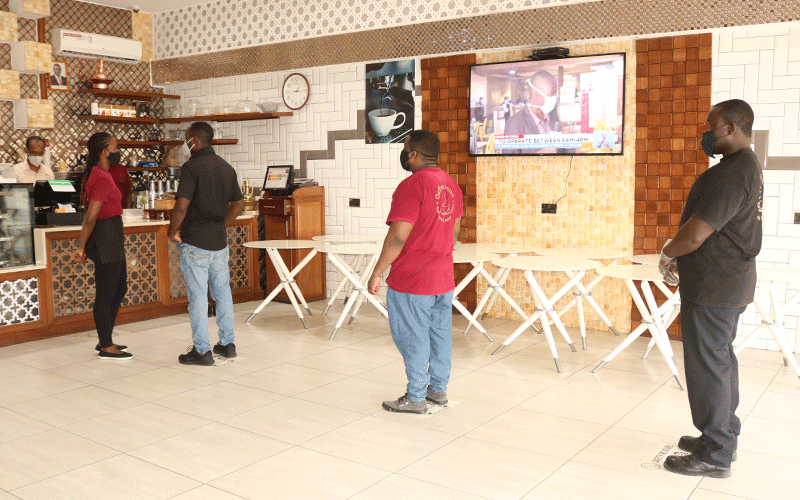Ban on flights, cost of Corona tests new headache for hotels

Harrison Kivisu, Alvin Mwangi and Mathew Ndung’u
Even as owners of hotels and restaurants welcome the decision to reopen the facilities, big tourist hotels and resorts are in a dilemma.
The hoteliers have to decide whether to open the facilities to local visitors, whose movements have been largely curtailed, or remain shut because there are few or no foreign visitors who normally constitute a bulk of their customers.
The viability of returning to business has been dimmed by the ban on international flights.
Owing to the cessation of movements in and out of Nairobi, Mombasa, Kwale, and Kilifi counties where most of the big hotels are located, the hoteliers are not assured of even local tourists. Mandera county is also locked.
The night curfew, and the requirement that they obtain fresh permits for Covid-19 safety compliance, has also complicated matters for hospitality businesses.
Traveler’s Beach Resort marketing manager Wafula Waswa said hotels would struggle to bounce back because of the ban on inbound flights and lack of disposable income for domestic tourists.
“Many people don’t have disposable income and with the travel restrictions still in effect, it will just be below 15 per cent of the normal business which is too little to sustain big resorts,” said Waswa.
Uphill task
Operators of budget hotels are also caught up in the same situation.
A spot check by People Daily at various hotels yesterday established that business was yet to resume with those still open only allowing customers to buy takeaway food.
Owners say the process of acquiring a coronavirus-compliance permit is an uphill task. Kenya Association of Hotelkeepers and Caterers Chief Executive Officer Mike Macharia said they are in talks with the Ministry of Health over the requirement that workers be tested for the virus, saying it could be too expensive.
Hotels and restaurants are required to subject their staff to coronavirus tests at their own cost.
“We’re exploring the option of keeping those we have been tested at the hotels because the only way to stay negative is to ensure they do not mingle with the masses,” he said.
Besides the testing of staff, Acting Director of Public Health Francis Kuria said the facilities will have to undergo inspection to ensure they comply with government directives to stop the spread of Covid-19.
Sh10,000 per test
“Owners are required to take their staff for coronavirus testing in government-accredited laboratories at their own cost and provide evidence of the same to the public health officer before inspection is done,” he said.
Some health facilities, such as Nairobi Hospital, have announced that they will carry out at least 900 tests per day for coronavirus at the cost of Sh10,000 per test.
Mohamed Jilani, a manager at Qaffee Point Restaurant in Mombasa, said the cost of testing employees could make it difficult for the facilities to re-open.
Jilani has five employees and going by the cost of testing at Nairobi Hospital, he may have to cough up Sh50,000.
“The guidelines are practically impossible because the demand for the tests will be very high and there are few laboratories certified to carry out the tests,” said Jilani.
Samuel Njenga, a supervisor at Cascade Hotel in Thika, says the facility which had sent home all its 120 workers, is planning to reopen all three branches.
He said they were planning to recall half of the staff, who would be tested for coronavirus, before they resume business next week.
Njenga, however, regretted that the process of getting back to business would be costly as the hotel would be required to spend a huge amount of money on testing of workers.
“For the 50 staff who have already been recalled, the hotel will be required to pay more than Sh500,000 for Covid-19 testing alone. That is too much for a business that has not been in operation for several weeks,” he said.
The facilities will also be required to host a maximum of four people for every 10 square metres and space tables at least 1.5 metres apart.
County Public Health Officer would visit the facilities to ensure they are compliant before issuing a permit.
Diani Reef Hotel General Manager Jotham Mwang’ombe said the facility had suffered huge losses due to cancellation of bookings.
“In the month of March alone, we made about Sh43 million in revenue, but since we have reduced operations this means in the month of April we will lose about Sh35 million which was our projection,” said Mwang’ombe.
Last week, Uhuru announced the reopening of restaurants and eateries “to protect businesses and jobs”.
Addressing the nation from State House, Nairobi, he said his government was exploring ways of re-opening the economy in a way that does not endanger Kenyans.













